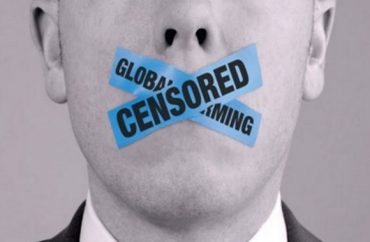
Two years of foot-dragging when the freedom to criticize public figures is at stake
A three-judge panel of the D.C. Court of Appeals took two years to deny a request to rehear one of the most important First Amendment cases since New York Times v. Sullivan.
The defendant in the case is tired of waiting for a court to affirm that criticizing a public figure is legal.
National Review asked the full municipal appeals court Thursday to review the panel’s 2016 ruling in favor of Pennsylvania State University climate scientist Michael Mann, who sued the conservative publication for defamation.
Mann’s lawsuit in 2012 and the surprising legal decisions in his favor spooked the journalism industry, which has overwhelmingly sided with National Review.
Mainstream media outlets and press freedom groups told the appeals court – four years ago now -that Mann was violating Washington, D.C.’s law targeting “strategic lawsuits against public participation.” Even the District of Columbia said Mann was violating its anti-SLAPP law.
Earlier this month, the panel finally ruled on National Review‘s two-year-old request for rehearing. It added a new footnote to the 2016 ruling, amended an existing footnote, and denied the petition. That’s it.
Why did that take two years? No one knows. (Law professor Jonathan Adler guessed a year ago that “at least some of the judges” on the appeals court were concerned about the “potential breadth” of the ruling. Apparently not.)
In an editorial last week, National Review blasted the appeals court for ignoring the anti-SLAPP law, which is expressly designed to discourage frivolous, expensive, time-consuming libel litigation.
“That a slam-dunk case that is being examined under an expedited process should have yielded so many years of expensive radio static is a genuine national disgrace, and should be widely regarded as such,” the editors wrote.
The silver lining, as noted by National Review Vice President Jack Fowler, is that the publication finally gets to appeal to the full D.C. Court of Appeals.
MORE: Appeals court rules Mann can keep suing conservative critics
‘Pejorative characterizations of a person’s conduct’ are not ‘provably false’
A brief recap: National Review published a blog post that approvingly referenced a Competitive Enterprise Institute post that said Mann “has molested and tortured data in the service of politicized science,” just as Penn State’s Jerry Sandusky molested children.
They were referring to Mann’s so-called hockey stick theory of climate change, and Penn State’s alleged rubber-stamp investigation of Mann for “scientific misconduct,” which cleared him of wrongdoing.
The three-judge panel’s ruling essentially found that no one is allowed to criticize Mann’s work and methodologies because Penn State had cleared him. Adler, the law professor, compared it to blessing a lawsuit against people who called George Zimmerman and Darren Wilson murderers even after they were exonerated of unlawful killings of black teenagers.
In the petition for en banc (full court) rehearing, National Review accused the panel of violating Sullivan by authorizing “the imposition of defamation damages for the expression of caustic criticism of a work of political and scientific advocacy.”
The blog post did not include “any concrete factual allegation” against Mann, such as “fabricating data,” but rather expressed the opinion that his methods were “improper and deceptive in their portrayal of global warming.”
It cited the “intense political and scientific controversy” over the hockey-stick graph popularized by Mann, including the scientist’s methodologies and “splicing together” of different types of data to reach his preferred result:
Under the First Amendment, this type of normative characterization evaluating the propriety of scientific work is not susceptible to being proved true or false in a jury trial. Instead, it is precisely the type of protected opinion that must be resolved through free and open debate. …
The panel’s slightly amended opinion continues to create the chilling prospect that the law in our nation’s capital will no longer tolerate free and open debate on matters of political and scientific controversy, because harshly criticizing the ethics and propriety of a scientist’s methods impugns his “scientific integrity.”
MORE: News outlets line up against Mann for suing critics
https://www.youtube.com/watch?v=cecmvYq_91A
The criticism of Mann is nothing more than “pejorative characterizations of a person’s conduct,” which are not “provably false” and hence not “actionable,” the brief argues. It cites two Supreme Court decisions that expressly found the characterizations of “serious,” “gross misconduct” and “integrity violations” are not verifiable.
The panel is simply wrong that “a jury could somehow resolve the ‘truth’ of these characterizations” in National Review “without deciding the validity of ‘criticisms of the hockey stick graph'”:
Even worse, the panel’s decision here stifles free speech on a matter of intense public concern: It authorizes punitive lawsuits against those who claim that certain data methods used in the global-warming debate are unethical and deceptive, effectively prohibiting expression of that view.
Mann opens himself to litigation by Big Oil in Texas
The brief mocks the panel for one of the changes it made to the opinion earlier this month, explaining that the characterizations of Mann’s work “specifically referred to” certain emails “and were therefore verifiable.”
This ignores the real question, which is whether the characterizations – not the “specific underlying facts” – are verifiable, in keeping with the court’s cited case law, National Review argues. “Whether the statistical techniques that Mann undisputedly used were ‘legitimate’ or instead ‘deceptive’ … is clearly a matter of protected opinion.”
The panel also runs squarely against precedent on the impossibility of removing First Amendment protections from a characterization “simply because it could be interpreted to assert a provably false fact,” the brief says. A jury cannot be entrusted with interpreting an “ambiguous” statement that a judge has determined is protected “as a matter of law.”
In order to get around the obvious problems in its analysis, the panel invented a distinction between ambiguous speech where “readers expect to find spirited critiques,” and “garden-variety” libels against the “professional character of a person” such as Mann.
This not only ignores precedent that makes no distinction between criticism of someone “personally” and criticism of their work, but also ignores that National Review‘s “opinion blog” is precisely where “readers expect to find spirited critiques.”
The full court would gut the “actual malice” standard, which turns on whether a defendant “subjectively entertained serious doubt as to the truth of his statement,” if it doesn’t overturn the panel, National Review argues.
The criticism of Mann had nothing to do with the basis for Penn State’s investigation – whether Mann “falsified data” – and the investigation in turn said nothing about whether “the hockey stick was deceptive,” as National Review claimed: “Thus, the panel’s ‘actual malice’ standard will subject Appellants to potentially crippling damages for a ‘falsified data’ allegation they never made.”
MORE: Think tanks argue Mann can’t muzzle critics in court
The panel agrees that National Review‘s opinion is protected – that the hockey-stick graph is “intellectually bogus and wrong.” Yet it would still subject the publication to “a Kafkaesque
inquiry into whether it ‘believed’ a statement it never published,” or put the publication on trial for its protected opinion, the brief argues.
The full court also must rebuke the panel for its “unprecedented and dangerous conclusion” that being “deeply invested in one side of the global warming debate” suggests that National Review “told knowing falsehoods” about Mann’s methods:
This not only empowers juries to financially penalize those with whom they disagree on vital matters of public debate, but invites them to do so especially against those who have exercised their First Amendment rights most vigorously, with “zeal in advancing their cause.”
Under Mann’s own reasoning, validated by the panel, the outspoken scientist could be just as easily sued into silence, National Review points out.
He has used the same language as National Review to impugn his critics – “scientific fraud,” “knowingly lying” and issuing “deceptive” reports. There’s nothing to stop “big oil
companies and other well-heeled interests” from suing their critics in Texas or Oklahoma, trusting that juries will “silence such criticism” for them.
MORE: Professor group wants to hide taxpayer-funded climate change research
MORE: You can’t invite George Will to speak because Mann doesn’t like him
IMAGE: Brett Tatman/Flickr
Like The College Fix on Facebook / Follow us on Twitter






Please join the conversation about our stories on Facebook, Twitter, Instagram, Reddit, MeWe, Rumble, Gab, Minds and Gettr.